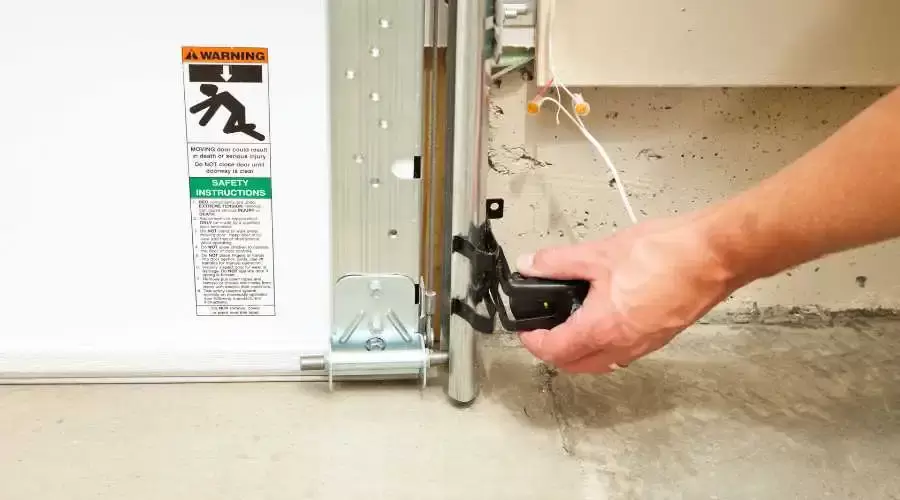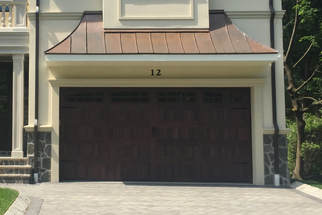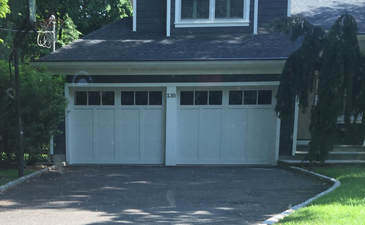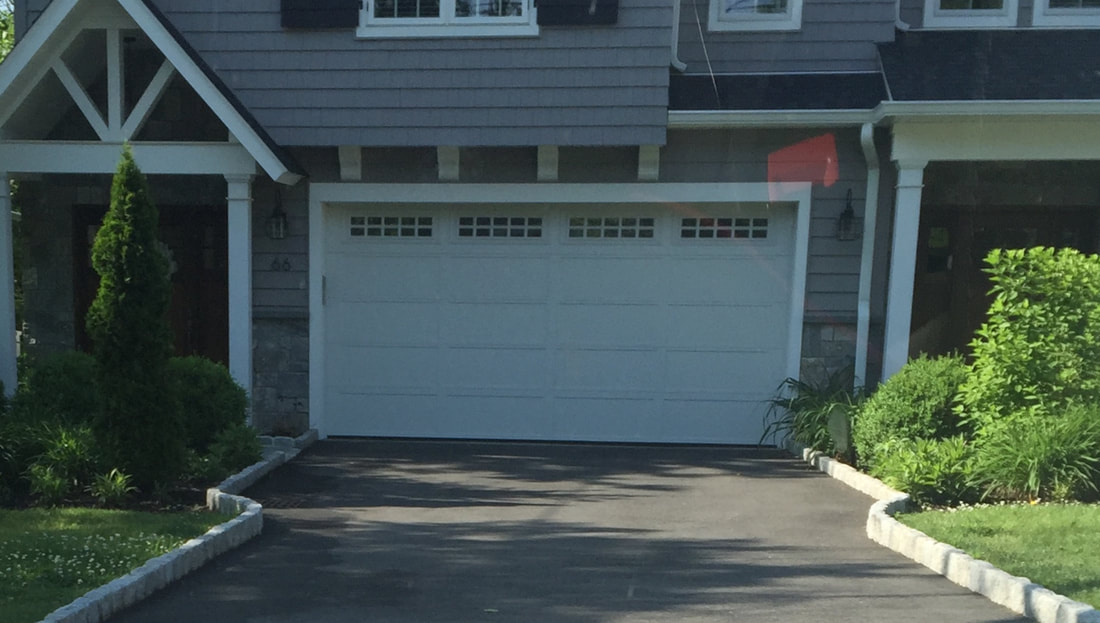|
It must have felt like magic when C.G. Johnson created the first electric garage door opener in Hartford, Indiana, in 1926. However, electric garage door openers became widespread after World War II, when the Chicago-based Era Meter Company devised a garage door opener that could be triggered by a switch within the garage or a key panel outside. Of course, the ability to open or shut an electronic garage door reduced over time to a little remote control that could fit on a keychain beside your vehicle keys. The ease of automated garage doors is highly valued. Regulations have been implemented to guarantee that they meet the most current safety requirements and continue to perform properly long after being installed. The federal government issued legislation on January 1, 1993, requiring any garage door erected after that date to incorporate sensors to avoid mishaps such as the door shutting while someone was standing underneath it. Since that time, all garage door openers have included door sensors, which, when engaged, keep the door from closing until all impediments have been removed. We'll spend more time below discussing how garage door sensors operate and what happens when they don't. But first, let's go over how automated garage door openers work in more detail.
How Do Automatic Garage Doors Work?A radio transmitter is the key to automated garage door openers. Early garage door openers made use of relatively primary transmitters and receivers. While it helped open and close your garage door, it also meant you could open and shut any garage door in the area that used a similar system. This has resulted in many amusing scenes in TV programs or advertisements in which someone picks up the remote control for the automatic door opener, believing it's a TV remote, hits a button, and opens their neighbor's garage door. Garage door openers are now radios that operate at 350 MHz. When you push the garage door opener button opener, it sends out a radio signal and an encoded binary number that works exclusively with the receiver in your garage. Your entry will open when your receiver "recognizes" the binary code number. Criminals, on the other hand, are problematic. Clever criminals may pick up the code on a radio, record it, and then play it back outside your garage door to unlock it and rob you. Fortunately, garage door manufacturers are more intelligent than robbers. A fresh code is generated each time you use a garage door opener. Computer chips in both the transmitter and the receiver identify the new code each time. Reasons Why Garage Door Sensors Don't WorkYou expect your automated garage door opener to function when you drive up in your vehicle and click the button. What happens if it doesn't? There might be many explanations for this potentially disappointing failure. Old Age of the Garage Door OpenerWhether it's people or garage door openers, Father Time is unbeatable. A garage door opener will do around 15,000 operations before going to that great big garage door opener house in the sky. Because most people use their garage door openers about 1,500 times a year, you should anticipate a solid 10 years before any difficulties caused just by aging appear. You can Track Not Aligned for the Garage Door Opener to keep it running for a few more years, but like with an older automobile, you can anticipate to make more expensive changes and repairs as time passes. Bad Batteries for the Garage Door OpenerIn some circumstances, the reason your garage door isn't operating correctly is as basic as it gets: you need new batteries. Even if your batteries are dead, your transmitter will continue to function. Check whether the transmitter on the inside of the garage still unlocks the door. If it occurs, replace the remote's batteries immediately away. If you push the transmitter again, and it works this time, the issue is fixed. Basement Door Opener Track Is MisalignedThis might be a significant problem. A correctly positioned metal track must support your door to open and shut. If gaps exist among the roller and the rail, or if the rail bends, it might create a problematic and perhaps hazardous scenario. Although there are several YouTube videos accessible on the internet that may demonstrate a DIY solution, this is most likely a situation where you should call someone who is experienced with how automatic garage door openers function to come and repair it. What Are Garage Door Sensors & How Do They Work?Another reason your garage door may not open is that your garage door sensors must be fixed. Before we get into why this occurs and how you might attempt to repair a garage door sensor, let's look at how garage door sensors function. Garage door sensors must have two components: Photo-EyeA photo-eye system is used in garage door sensors. These infrared sensors are mounted. Your garage doorshould be 3–6 inches taller than the ground on either side. When you use your garage door remote to open it, it sends a signal to the sensors, causing the door to open. The primary function of the image eyes, however, is to prevent the door from closing. Anybody or anything. Line of SightAs soon as the door is open, nothing obstructs it, the photo eyes on each side of the door broadcast an infrared beam to each other. The door will only shut if the beam is not broken. However, if a human, animal, or bicycle is in the path and the beam is disrupted or obstructed, the door will not shut but will reopen. How Do I Determine If It's a Problem With the Garage Door Sensor?If your garage door opens then but adequately does not shut or begins to close but then reopens without any blockages, your garage door sensor is malfunctioning. This might lead to two significant issues. The first issue is that the door would stay open. A faulty garage door sensor might cause this problem. To shut the door, use the remote control or the electrical switch on the garage's interior. If the door begins to shut but suddenly stops and reverses, leaving it open, there is a problem. The second problem comes when the door shuts despite an obstacle. This is the second indicator of a potentially faulty door sensor, and it's a far more significant concern since it can injure or substantially damage your automobile or other piece of equipment. To see whether the sensors are broken, do the following:
How Do You Repair Garage Door Opener Sensors?If you've discovered that your garage door sensor isn't functioning for one of the reasons listed above, there are several easy fixes you may try. If you're wondering how to repair your garage door sensor, consider the following two methods: Dirty LensesThis is most likely the cause of a garage door that will not shut. The most apparent cause of the issue might be filthy lenses. These lenses are constructed of glass, similar to that used in camera lenses. Door sensors' picture eyes are relatively tiny and easily dirty with time. Use a delicate cloth and a gentle cleanser that won't leave streaks. Wipe away any debris or residue from the eye's surface gently. Please don't overdo it since getting the eye too moist can cause extra dirt to attach to it. Out of AlignmentMisaligned photo eyes are another cause of garage door sensor failure. The picture eyes must all be pointing simultaneously and in the same direction angle. There is an LED light on every sensor. If one of these lights blinks, the sensor is out of alignment. Adjust the screws holding up the flashing lamp bracket. LED light until it is aligned with the other one. You can also return the bracket to its previous place. The blinking will cease after you readjust the sensor lights. It's now time to put your skills to the test. Put another cardboard box in front of one of the picture eyes. Toggle the remote control. Your goal is complete if the door begins to shut but then reopens because the beam between the corrected photo eyes is now blocked. If, on the other hand, the door continues to shut and smashes the new cardboard box, you may have a more significant issue. Check again to ensure the lenses have been thoroughly cleaned, the picture eyes are aligned, and no LED light is flashing. One more time, try the cardboard test. If the door does not return to the open position and instead shuts on the cardboard box, it is necessary to contact a specialist to inspect the complete system. The garage door opener does not function in the opener in cold weather.It's always conceivable that your problem is weather-related. If it's frosty outside, the lining of your garage door may be frozen, which is why it won't open. Or there might be dampness on your sensors, preventing them from working properly. How To Disable a Garage Door Safety SensorTo guarantee that nothing is destroyed, you should deactivate your garage door safety sensor until expert assistance comes. You may gently twist one such that the sensors do not line up, momentarily disabling the sensor. You may only want to do something more in-depth once you get expert assistance since you want to avoid permanently harm the system. Why Should I Call a Professional for My Garage Door Safety Sensors?We suggest speaking with a professional if your door sensors still need to be fixed after implementing the steps outlined above because you may have a wiring issue. Anything involving electricity or wiring should always be. For safety considerations, this should be left to a professional because the wrong installation might cause severe harm. This kind of DIY project is still being determined for you. However, wiring may be complex and, as you know, possibly hazardous. A garage door specialist has experience and understanding of dealing with a wide range of systems and the tools and equipment required to resolve the issue. It can take checking out the other parts of your garage door. The plan is to see if any additional repairs are required for your door to function correctly again. When your garage door sensor is malfunctioning, call in a professional is best. A garage door pro will be capable of inform you whether the issue is beyond repair and if you should acquire a new garage door in addition to repairing it. Fort Lee Garage Doors Service Can Help Fix Your Garage Door Problems or Install a New OneFort Lee Garage Doors Service has been servicing the automated door requirements of Fort Lee NJ for almost four decades. As a family-owned company, we focus on strong client connections and provide each customer the special attention they deserve.
We have installed over 130,000 garage doors on residential and commercial structures since our inception in 1972. A few things that have helped us include doing well are our reasonable rates and the high. We are known for how well we do. Our work and the great service we give each of our clients. Whether you speak with one of our management team members, customer service representatives, or installers, we guarantee you will get the finest service possible until you are entirely happy. You may reach us at 201-800-6757 or request an estimate, and a member of our knowledgeable staff will respond as soon as possible. If you are already a customer and want to arrange an appointment, please visit our scheduling page so that we can assess how we can assist you and when we can come to you. We can't wait to fix your garage door problems.
0 Comments
Leave a Reply. |
|
Fort Lee Garage Doors
http://www.fortleegaragedoors.com |
copyright 2013 fort lee garage door service
|


 RSS Feed
RSS Feed


